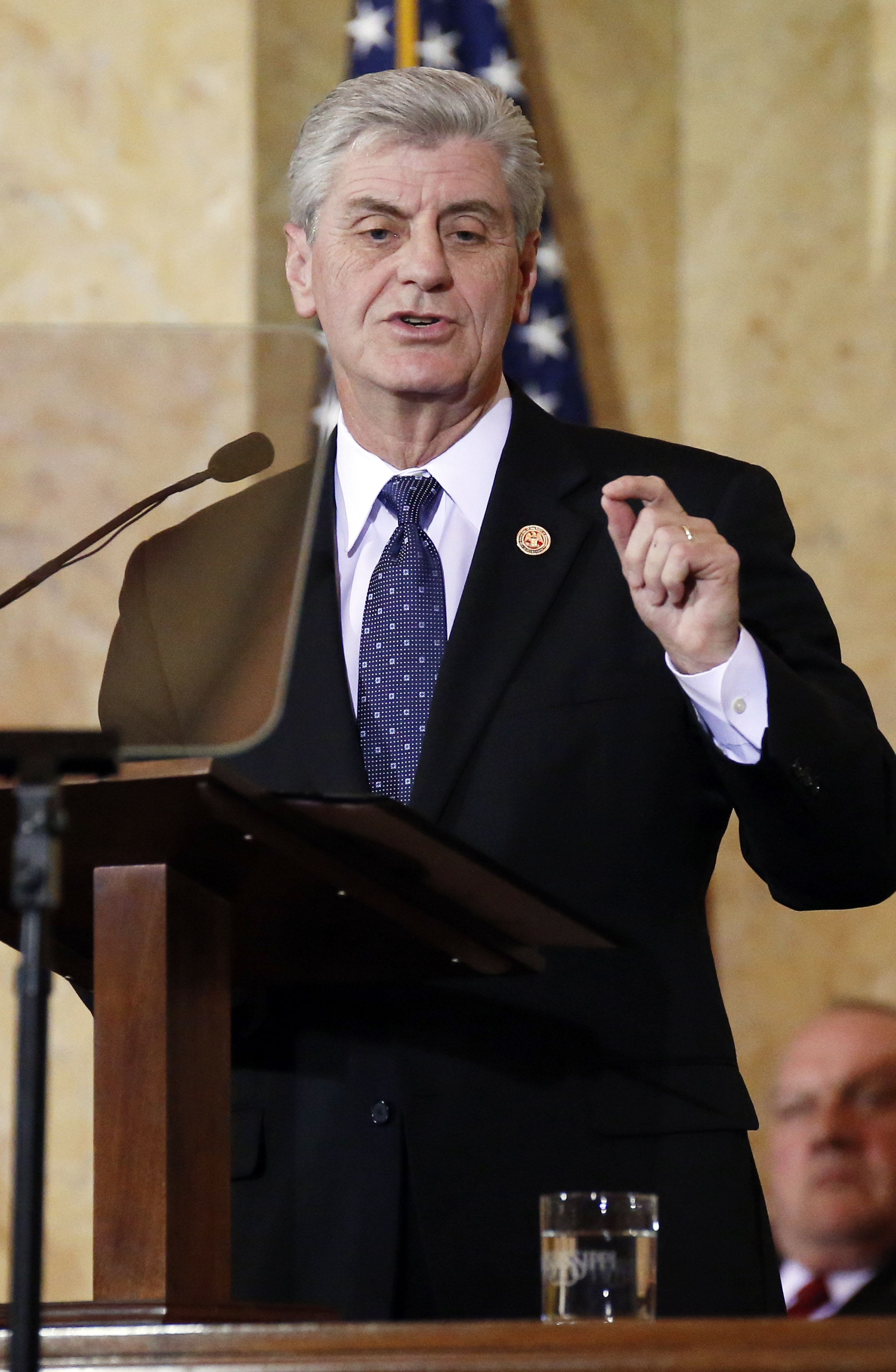![AP MISSISSIPPI-STATE OF THE STATE A USA MS [image : 82658760]](http://www.gannett-cdn.com/media/2016/04/05/USATODAY/USATODAY/635954608578991532-AP-Mississippi-State-Of-The-State.jpg)
JACKSON, Miss. — On the heels of a North Carolina law enacted two weeks ago, Mississippi's governor signed controversial anti-gay legislation Tuesday, saying he did so to protect the rights of people with "deeply held religious beliefs."
House Bill 1523 has drawn state and national attention with groups as varied as the Human Rights Campaign and the Mississippi Manufacturers Association all calling for Gov. Phil Bryant to veto the legislation.
Minutes after signing it, Bryant appeared on the JT Show on WLAU-AM, a conservative talk radio station based in Laurel, Miss., to discuss the new law, which is effective July 1; North Carolina's law was effective immediately. Bryant defended his actions, saying it prevented "government from interfering with people of faith who are exercising their religious beliefs ... in matters of marriage."
The Mississippi governor said the new law would not allow discrimination of anyone.
"This bill does not create one action against any class or group of people," he said. "It doesn't create a new action or a new defense of an action against those people."
![PayPal withdraws planned N.C. expansion due to anti-gay law [oembed : 82658302] [oembed : 82658302] [oembed : 82658302] [oembed : 82658302] [oembed : 82658302] [oembed : 82658302] [oembed : 82658302] [oembed : 82658302] [oembed : 82658302] [oembed : 82658302] [oembed : 82658302] [oembed : 82658302] [oembed : 82658302] [oembed : 82658302] [oembed : 82658302] [oembed : 82658302] [oembed : 82658302] [oembed : 82658302] [oembed : 82658302] [oembed : 82658302] [oembed : 82658302] [oembed : 82658302] [oembed : 82658302] [oembed : 82658302] [oembed : 82658302] [oembed : 82658302] [oembed : 82658302] [oembed : 82658302]](/Portals/_default/Skins/PrestoLegacy/CommonCss/images/smartembed.png)
Bryant's spokesman, Clay Chandler, denied The Clarion-Ledger's request for an interview Tuesday.
Bryant also denied opponents' claims that the law, which is almost certain to face legal challenges, would allow restaurants or governments to deny normal services to gay or lesbian people unless it was in the performing of a wedding ceremony. He cited a restaurant as an example, saying that a restaurant would not be allowed to deny serving a gay patron but could deny allowing a wedding to take place in the restaurant.
![AP RELIGIOUS OBJECTIONS A XGR USA MS [image : 82658762]](http://www.gannett-cdn.com/-mm-/0afc57fbca4b3af983bc4784e22e9094665ee365/c=0-0-3209-2743/local/-/media/2016/04/05/USATODAY/USATODAY/635954608732340515-AP-Religious-Objections.jpg)
However, provisions in HB 1523 state that people can deny services or goods for the "celebration or recognition of any marriage, based upon or in a manner consistent with a sincerely held religious belief or moral conviction," which would include pre-ceremony celebrations, post-wedding celebrations, anniversary celebrations and other related celebrations, opponents argue.
Before the governor signed the bill, he refused to meet with lesbian, gay, bisexual and transgender people and ignored business leaders, said the president of the Human Rights Campaign, which protested Monday outside the state Capitol and the Governor's Mansion.
"And now his state will suffer because of his ignorance and failure of leadership," the organization's president, Chad Griffin, said in a statement. "Just as we're doing elsewhere, we will continue to rally fair-minded voters, businesses, and civil rights advocates to repeal."
The Family Research Council, a Christian lobbying group, applauded the governor's decision to sign the bill and called business' opposition economic blackmail.
"No person should be punished by the government with crippling fines or face disqualification for simply believing what President Obama believed just a few years ago, that marriage is the union of a man and a woman," council President Tony Perkins said.
Bryant said he believes that many arguments against the bill were filled with misinformation.
![Judge halts Miss. same-sex adoption ban [oembed : 82658374] [oembed : 82658374] [oembed : 82658374] [oembed : 82658374] [oembed : 82658374] [oembed : 82658374] [oembed : 82658374] [oembed : 82658374] [oembed : 82658374] [oembed : 82658374] [oembed : 82658374] [oembed : 82658374] [oembed : 82658374] [oembed : 82658374] [oembed : 82658374] [oembed : 82658374] [oembed : 82658374] [oembed : 82658374] [oembed : 82658374] [oembed : 82658374] [oembed : 82658374] [oembed : 82658374] [oembed : 82658374] [oembed : 82658374] [oembed : 82658374] [oembed : 82658374] [oembed : 82658374] [oembed : 82658374]](/Portals/_default/Skins/PrestoLegacy/CommonCss/images/smartembed.png)
"What I've seen in my business, when people in the secular community want to attack a bill, and they give the worst possible examples of what will happen," he said.
Ten states have passed or are considering similar bills, according to the National Conference of State Legislatures.
![Gov. Phil Bryant, Mississippi Republican [pullquote : 82662974]](/Portals/_default/Skins/PrestoLegacy/CommonCss/images/pullquote.jpg)
North Carolina's governor, Republican Pat McCrory, and its Legislature approved a similar law March 24. On Tuesday, PayPal canceled plans for an expansion that would have created 450 jobs there, and a television studio pulled upcoming production from the state.
Both actions were in response to the new law.
In Georgia after protests from businesses, Republican Gov. Nathan Deal vetoed that state's bill March 28.
In Mississippi, a spokeswoman for Nissan (NSANY) said the automaker's statement from last week in opposition to HB 1523 "still stands."
"It is Nissan's policy to prohibit discrimination of any type, and we oppose any legislation that would allow discrimination against lesbian, gay, bisexual and transgender individuals," the statement read. Nissan's car and truck plant in Canton, Miss., has been in operation since 2003 and employs more than 6,000 people, making it the largest private employer in the state.
Nissan has not indicated what consequences might arise from Mississippi's enactment of the discrimination law.
New York Gov. Andrew Cuomo and Vermont Gov. Pete Shumlin, both Democrats, decided Tuesday to ban official, non-essential state travel to Mississippi in light of the law and made the same decision last week on North Carolina after its law was enacted. District of Columbia lawmakers also are considering a travel ban that would become effective automatically for any state that approves similar laws.
![Georgia governor vetoes bill denounced as legalizing anti-gay discrimination [oembed : 82658256] [oembed : 82658256] [oembed : 82658256] [oembed : 82658256] [oembed : 82658256] [oembed : 82658256] [oembed : 82658256] [oembed : 82658256] [oembed : 82658256] [oembed : 82658256] [oembed : 82658256] [oembed : 82658256] [oembed : 82658256] [oembed : 82658256] [oembed : 82658256] [oembed : 82658256] [oembed : 82658256] [oembed : 82658256] [oembed : 82658256] [oembed : 82658256] [oembed : 82658256] [oembed : 82658256] [oembed : 82658256] [oembed : 82658256] [oembed : 82658256] [oembed : 82658256] [oembed : 82658256] [oembed : 82658256]](/Portals/_default/Skins/PrestoLegacy/CommonCss/images/smartembed.png)
Travel and tourism revenue contributed $388 million to Mississippi's general fund in fiscal year 2014 and played a part in nearly 115,000 jobs, about 1 in 10 jobs statewide, according to Visit Mississippi, the state's tourism agency.
Mississippi House Speaker Philip Gunn, a Republican from Clinton, Miss., who is author of the new law, said business leaders who have come out against HB 1523 don't understand its provisions. He believes that the new law will withstand legal challenges and hopes that it won't hurt economic development.
Lawmakers in Mississippi and elsewhere have used the religious-liberty argument before to justify discrimination, said Jody Owens, managing attorney of the Southern Poverty Law Center. In earlier eras, white supremacists used that rationale to condone slavery and Jim Crow-era prejudice against blacks.
![Virginia transgender case could weigh on new N.C. law [oembed : 82659854] [oembed : 82659854] [oembed : 82659854] [oembed : 82659854] [oembed : 82659854] [oembed : 82659854] [oembed : 82659854] [oembed : 82659854] [oembed : 82659854] [oembed : 82659854] [oembed : 82659854] [oembed : 82659854] [oembed : 82659854] [oembed : 82659854] [oembed : 82659854] [oembed : 82659854] [oembed : 82659854] [oembed : 82659854]](/Portals/_default/Skins/PrestoLegacy/CommonCss/images/smartembed.png)
“This is a sad day for the state of Mississippi and for the thousands of Mississippians who can now be turned away from businesses, refused marriage licenses, or denied housing, essential services and needed care based on who they are," Executive Director Jennifer Riley-Collins of the American Civil Liberties Union of Mississippi. "This bill flies in the face of the basic American principles of fairness, justice and equality and will not protect anyone’s religious liberty."
Contributing: David Bean, The (Jackson, Miss.) Clarion-Ledger. Follow Sam Hall and Geoff Pender on Twitter: @samrhall and @GeoffPender
![Speaker Philip Gunn on gov signing his religious objections bill [video : 82658710]](http://bcdownload.gannett.edgesuite.net/jackson/41188240001/201604/2196/41188240001_4832580844001_4832479911001-vs.jpg?pubId=41188240001)
![State [oembed : 82657960] [oembed : 82657960] [oembed : 82657960] [oembed : 82657960] [oembed : 82657960] [oembed : 82657960] [oembed : 82657960] [oembed : 82657960] [oembed : 82657960] [oembed : 82657960] [oembed : 82657960] [oembed : 82657960] [oembed : 82657960] [oembed : 82657960] [oembed : 82657960] [oembed : 82657960] [oembed : 82657960] [oembed : 82657960] [oembed : 82657960] [oembed : 82657960] [oembed : 82657960] [oembed : 82657960] [oembed : 82657960] [oembed : 82657960] [oembed : 82657960] [oembed : 82657960] [oembed : 82657960] [oembed : 82657960]](/Portals/_default/Skins/PrestoLegacy/CommonCss/images/smartembed.png)
![I have signed House Bill 1523. Full statement: pic.twitter.com/00DbgQADFtmdash; [oembed : 82660206] [oembed : 82660206] [oembed : 82660206] [oembed : 82660206] [oembed : 82660206] [oembed : 82660206] [oembed : 82660206] [oembed : 82660206] [oembed : 82660206] [oembed : 82660206] [oembed : 82660206] [oembed : 82660206] [oembed : 82660206] [oembed : 82660206] [oembed : 82660206] [oembed : 82660206]](/Portals/_default/Skins/PrestoLegacy/CommonCss/images/smartembed.png)
Related:
![North Carolina anti-gay law may jeopardize 2017 NBA All-Star Game [oembed : 82658408] [oembed : 82658408] [oembed : 82658408] [oembed : 82658408] [oembed : 82658408] [oembed : 82658408] [oembed : 82658408] [oembed : 82658408] [oembed : 82658408] [oembed : 82658408] [oembed : 82658408] [oembed : 82658408] [oembed : 82658408] [oembed : 82658408] [oembed : 82658408] [oembed : 82658408] [oembed : 82658408] [oembed : 82658408] [oembed : 82658408] [oembed : 82658408] [oembed : 82658408] [oembed : 82658408] [oembed : 82658408] [oembed : 82658408] [oembed : 82658408] [oembed : 82658408] [oembed : 82658408] [oembed : 82658408]](/Portals/_default/Skins/PrestoLegacy/CommonCss/images/smartembed.png)
![N.C. governor signs repeal of transgender protections [oembed : 82659756] [oembed : 82659756] [oembed : 82659756] [oembed : 82659756] [oembed : 82659756] [oembed : 82659756] [oembed : 82659756] [oembed : 82659756] [oembed : 82659756] [oembed : 82659756] [oembed : 82659756] [oembed : 82659756] [oembed : 82659756] [oembed : 82659756] [oembed : 82659756] [oembed : 82659756] [oembed : 82659756] [oembed : 82659756]](/Portals/_default/Skins/PrestoLegacy/CommonCss/images/smartembed.png)
![N.C. city OKs controversial transgender bathroom bill [oembed : 82659688] [oembed : 82659688] [oembed : 82659688] [oembed : 82659688] [oembed : 82659688] [oembed : 82659688] [oembed : 82659688] [oembed : 82659688] [oembed : 82659688] [oembed : 82659688] [oembed : 82659688] [oembed : 82659688] [oembed : 82659688] [oembed : 82659688] [oembed : 82659688] [oembed : 82659688] [oembed : 82659688] [oembed : 82659688]](/Portals/_default/Skins/PrestoLegacy/CommonCss/images/smartembed.png)


